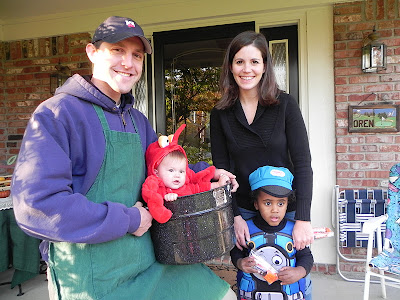As a Christian family who seeks to live a Jesus-centered, Gospel-centered life, we are constantly needing to evaluate the culture we live in through the lens of the Bible and the thinking mind God gave us.
In light of what I've written below, as a family we have chosen to exercise our Biblical freedom (1 Corinthians 10:22-23), to wisely redeem cultural practices. We have fun with Halloween by dressing up and going trick or treating. We did wade through the trickier issues necessary such as ghosts, witches, and other scary, fear based costumes, along with the cultural obsession with the "dark, gruesome" side of life after death. That's a sensitive issue in my heart as heaven and hell are very real places and I feel our view and talk of them should be in a Biblical sense.
Halloween 2011
Evie Rae was a lobster, carried in a pot by Daddy playing a lobster man. And Mekonen was his latest obsession... Thomas the Tank Engine! All day before trick or treating, Mekonen kept asking, "Where's my Halloween?" (meaning his costume). haha.
First stop, Grandma Magz and Boppy's house.
Evie's pot fit perfectly in the stroller and her face is busting with joy. Makes me laugh every time I see it.
Our little Thomas the Tank Engine. That smile could light up the world.
And our happy, happy girl.
Halloween has long been debated in Christian circles as whether or not it's right or wrong to participate. This is an issue we have had to evaluate as we begin our journey in raising our children. However, it's not as simple, nor as black and white as some Christians like to make it. Yes, that would be easier because it would satisfy the "religious self" that we try so desperately to get rid of- the one that thinks being a Christian is simply following rules. Sure that would be "easier" and actually would give us a way to receive some praise for how "good we are being" and thus how "righteous" we are. But we are called to much more than that, and I am afraid that many Christians today just don't know how to think and would prefer that the Bible say specifically, "Thou shalt not trick or treat or be involved in Halloween." Since that hasn't been laid out for us we have some homework to do!
1. Research the aspect of culture that you discussing, i.e. Halloween.
It will take far too long to write the history of Halloween here, and it's not necessarily the point of this post. So in short, the holiday did, in some part, originate from pagan and mythical practices. But calling it "Satanic"can merely end up being a game of semantics. (What about Roman and Greek mythology, etc?) Maybe all these things are "satanic," maybe they aren't. Therefore, Christians need to exercise thoughtful discernment when coming to conclusions about such matters.
2. Reject, Receive, or Redeem, in this case, Halloween (This is similar to my post last year on
what to do about Santa Clause. I like these 3 R's from a favorite pastor of ours in evaluating cultural issues).
Reject
- A Christian named Pat Robertson called Halloween the "festival of the Devils" and said it was wrong for Christians to participate. But to reject it outright without answering this question, is foolish... "To what extent does something's evolution from pagan roots entail that its present practice is tainted?" Because today, there's been a huge shift in the original practices of Halloween, to kids dressed up in cute costumes for a sugar fest once a year.
- If you are going to outright reject Halloween are you consistent in rejecting other holidays completely as well? There are pagan practices rooted in most holidays as is excess, like too much candy on Halloween. So should we reject Thanksgiving too because some people eat too much and gluttony is a sin?
- Other Christians reject Halloween because they fear the "evil of the extrinsic world will taint the faith of a Christian. The idea is, 'garbage in, garbage out.' But Jesus says the exact opposite is true in Mark 7:21-23. The fruit of our lives (whether holiness or sin) is always inextricably tied to the root of our hearts. Sin indeed corrupts but the sin is not so much 'out there in the world' as much as it is in the heart of every person. The reject position falsely assumes sin is mostly what we do rather than who we are.
Receive and/or Redeem
- If we have an informed understanding of the history of Halloween and realize that as a Christian we have the biblical freedom to redeem cultural practices (1 Corinthians 10:22-23), we believe that Christians should follow their conscience in choosing how to approach this holiday.
- How one goes about which aspects of Halloween to redeem or receive is still a tricky issue. One suggestion is to distinguish between the cultural aspects of Halloween and the religious aspects of Halloween. "There is a big difference between kids dressing up in cute costumes for candy and Mardi-Gras-like Halloween parties, offensive costumes, and uninhibited excess."
- "It's naive to make a blanket judgment to reject or receive Halloween as a whole. There should be no pressure to participate, but for those Christians whose conscience permits, we should view it as an opportunity to engage wisely with our culture."
(Many ideas were summarized from an article on the Resurgence blog by Justin Holcomb).














































